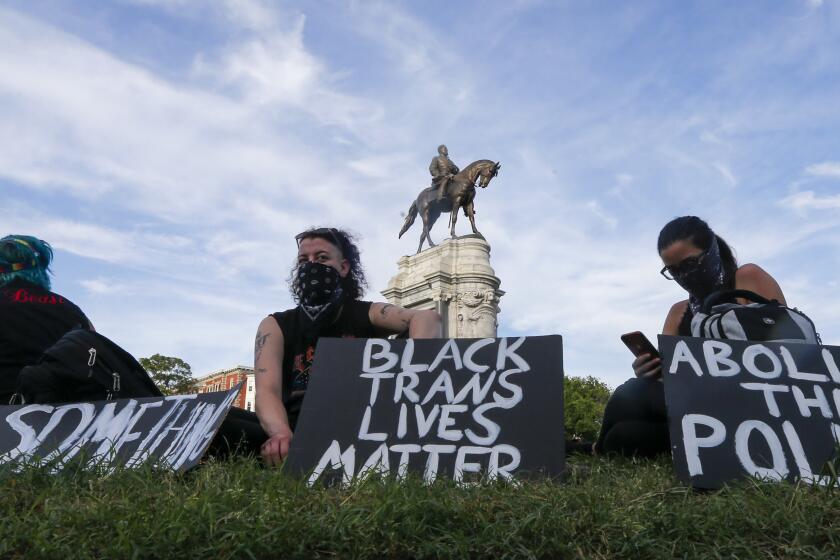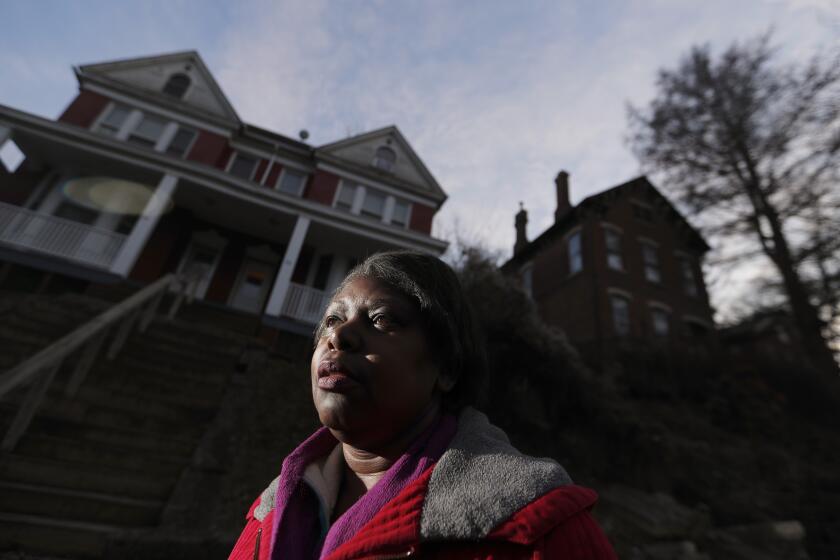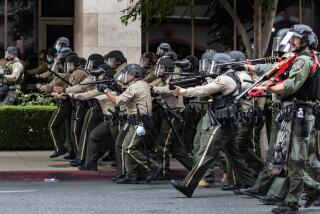‘Something is not right.’ George Floyd protests push white Americans to think about their privilege
- Share via
GUALALA, Calif. — Mike Sexton is white and a Republican who lives in an affluent suburb of Fort Worth, where many neighbors back President Trump and some work in law enforcement. Rage wells up in his voice as he says that George Floyd, a Black man, was “basically lynched.”
Shawn Ashmore is an independent who lives nearby in east Dallas. He’s using Floyd’s killing to teach his young sons uncomfortable lessons about the privileges their family enjoys because they’re white — how, for instance, they’ll never fear for their lives during an encounter with the police the way some Black men do.
Lisa Joakimides lives in rural Northern California and considers herself a well-meaning Democrat. After the election of Barack Obama in 2008, Joakimides, who is white, convinced herself that America was finally making amends for its history of mistreating Black people.
As Joakimides got down on both knees to honor Floyd at a roadside demonstration in early June, she wondered how she could have been so naive.
Floyd’s killing in Minneapolis, captured in witness videos showing then-Officer Derek Chauvin kneeling on Floyd’s neck, has led white Americans to call out racism against Black Americans more vigorously than at any moment in recent memory. And it’s prompting many white people to think more deeply about the color of their own skin.
Why now? Chicago-based sociology professor Jacqueline Battalora believes that after three wearying months of social isolation and economic upheaval brought on by the COVID-19 pandemic, Floyd’s killing was yet another blow to the illusions of safety, security and equality that many white people harbor about America.
“The police are fair; institutions are fair — white people have been so happy to believe those things,” said Battalora, a former police officer and author of “Birth of a White Nation: The Invention of White People and Its Relevance Today.” “What this signals is that a good chunk of white people now have some recognition that something’s not right.”
For Sexton, Ashmore and Joakimides, the killing of Floyd and outpourings of rage have forced them to see that expressions of sympathy and displays of solidarity with Black people are only the beginning. America won’t change its racist ways, they say, unless white people use this period of protest and reflection to change, too.
What’s different this time, Sexton said, is that white people have gained a better sense of where that outrage comes from, and how insulated they are from the racial injustices that provoke it.
Sexton, 45, said he can’t sit on the sidelines of the protest movement, or shy away from the national conversation about racism and police brutality, simply because he votes red instead of blue.
“It’s not right versus left,” he said. “It’s right versus wrong.”
Sexton said he wasn’t oblivious to racial discrimination. Every Black person he knows has shared stories of being followed and stopped for no reason by police.
But the video of Floyd’s killing, which captured him crying out “I can’t breathe” and calling out for his dead mother, made Sexton realize the powerlessness and sheer panic that Black people often experience in the presence of officers.
He said it’s crazy that it took so long for him and other white people to fully grasp that horror of police brutality, “but for us, we wouldn’t have understood were it not for the video.”
“Now,” he said, “we’re listening.”
Sexton, a salesman, recently organized a rally for police accountability in a high school parking lot near where he lives in Grapevine, Texas. It drew about 200 demonstrators, most of them white.
Members of the clergy and Grapevine Police Chief Mike Hamlin attended. One of the speakers was a Trump supporter.
A Black teen told the crowd that she was afraid to bring children into the world because she feared she wouldn’t be able to protect them from law enforcement or the country’s racism.
“That broke my heart into a thousand pieces,” Sexton said.
Antiracism protests following the death of George Floyd are happening even in rural, mostly-white communities. Along with them have come threats and rumors.
After weeks of protest, opinions about police violence appear to be shifting, but there’s still a large gap between white and Black people about whether it represents a national crisis.
In an AP-NORC poll taken in mid-June, fewer than half of white respondents — 39% — believe that police violence against the public is either an extreme or very serious problem, compared with 80% of Black respondents.
Those numbers did show a shrinking of the gulf between the way white and Black Americans view the issue. The same poll was taken in the early stages of the Black Lives Matter movement in 2015, and then only 19% of white people said police violence was an extreme or serious problem, compared with 73% of Black people.
“It created this opening for white people,” Battalora said of Floyd‘s killing. “But that’s different from saying we ‘get it.’ That will be more of a process.”
It remains to be seen whether the spectacle in recent days of white people locking hands to protect Black demonstrators from riot police, or taking part in the toppling of monuments to Confederate soldiers and slaveholders, represents a turning point.
The National Trust for Historic Preservation now supports the removal of public Confederate monuments, regardless of how old or “historic” they may be.
“You have those historic moments where the nation can go one way or the other way,” said Clayborne Carson, a civil rights scholar at Stanford University.
“But you just have to wonder — why did it take so long?” said Carson, the founding director of the Martin Luther King Jr. Research and Education Institute and senior advisor on “Eyes on the Prize,” the public television series on the civil rights movement. “It’s not as if George Floyd was the first Black man to be killed by the police.”
Carson was a student activist in the 1960s in Watts, then a heavily Black community. He saw firsthand how unrest over police brutality resulted in a backlash from anxious white people, many of whom flocked to “law and order” politicians like Ronald Reagan and Richard Nixon who promised to crack down on demonstrators.
“You want to hope that it’s going to go in a more positive, progressive direction, but there’s also a strong element in American history of riding the wave of the resentment toward people pushing for change,” Carson said.
“That’s always the political choice. Do you vote out of fear fueled by racism or do you vote out of hope that things will get better? But fear is powerful.”
::
As a father raising two young boys in Dallas, a city with its own history of racial tension and fatal police violence, Ashmore, 38, said he’s focused on making sure his sons don’t grow up with a fear or suspicion of Black people.
Many Black parents give their children “the talk” to teach them how to stay safe when they encounter the police. Ashmore faces a different challenge with his sons, who are 6 and 8 years old — explaining how wrong it is that their Black classmates do not live in a world as fair and safe as the one they live in.
“We have a lot of things that are given to us because of the color of our skin,” Ashmore remembered telling his sons. “Mom and I try to make sure we don’t use our advantages to hurt other people.”
“If we do,” he told them, “we’re wrong.”
Floyd’s killing has filled Ashmore with sadness, anger and self-doubt.
He keeps thinking about the detached look on the police officer’s face as he knelt on Floyd’s neck.
“The eyes,” he said. “It seemed so cold-blooded, lacking heart.”
Ashmore said he can’t fathom ever treating a Black person that way.
“I’m a nice person; I can’t be racist.” Ashmore has said those words to himself in the past, and he knows other white people say them, too.
“But do I have parts that are buried somewhere in me that I’ve kept protected?” he’s thought to himself.
“What are my blind spots” as a white man? “What am I tuning out?”
Ashmore has learned that he can be a good man and great father and aspire to make the world a better place, yet still benefit from a racist system that values his life more than that of the Black men, women and children captured in those wrenching scenes of mistreatment and death.
“This is serious surgery we’re going through,” Ashmore said of the self-examination among whites.
That inner conflict — between thinking of yourself as a decent person and acknowledging the possibility that you might be contributing to racial injustice in some way — has left Joakimides feeling disillusioned.
A series of cross burnings 30 years ago led the residents of Dubuque, Iowa, to ask, “Why do we hate?” In the lead-up to the 2020 Iowa Democratic caucuses, L.A. Times reporter Tyrone Beason traveled to Dubuque, Iowa, to find out whether its efforts to confront racism and inequality are working, and what the rest of the country can learn from its example.
“It’s hard to see yourself as part of the problem when you’ve spent your entire life trying not to be,” said Joakimides, a chef in the Northern California village of Point Arena, situated in an area of windswept Pacific beaches and redwood forests about a three-hour drive north from San Francisco.
She was one of about two dozen sign-waving protesters, almost all of them white, who had gathered to demonstrate by the side of Highway 1 in the nearby town of Gualala.
They’d all come to show their solidarity with those around the country who were demanding an end to police brutality — despite living in a remote corner where Black faces are few.
Wearing a mask to protect herself from COVID-19, Joakimides held back tears and stared solemnly at the ground.
She held a cardboard sign meant for anyone who’s still not convinced they can help overcome racism: “Be an ally. Become the solution.”
All she could say about Floyd’s killing was, “I’m horrified.”
“I thought we were making progress towards equality,” she said. She let out a long sigh. “But things keep happening.”
Even as a progressive who feels she’s on the right side of history by supporting efforts to tackle climate change, sexual harassment and racist policing, Joakimides knows that she, too, has to be more honest with herself about what it means to be white in America.
“It’s very easy to get used to the privilege of a safe life,” said Joakimides, 57. “It’s time to acknowledge my privilege — and to use it to fight oppression.”
Sexton, the salesman from Texas, said he’s encouraged that so many white people in his community seem to feel as passionate about stopping police brutality as he does.
But he’s also seen derogatory messages on Facebook about his efforts, including a post from a detractor who wrote “White lives matter” in response. Still, he’s adamant that white conservatives like himself must look past the mockery and racist comments within their own ranks and do their part.
Like Ashmore, he understands that change starts not in the halls of government and in police departments, but at home.
Sexton speaks with pride about his 11-year-old son, Tyler, who stood next to him at the rally holding a sign he made by himself to express his outrage over the length of time the officer kept his knee on Floyd’s neck.
It read: “It should not take 8 minutes, 46 seconds to see that Black Lives Matter.”
More to Read
Get the L.A. Times Politics newsletter
Deeply reported insights into legislation, politics and policy from Sacramento, Washington and beyond. In your inbox twice per week.
You may occasionally receive promotional content from the Los Angeles Times.













